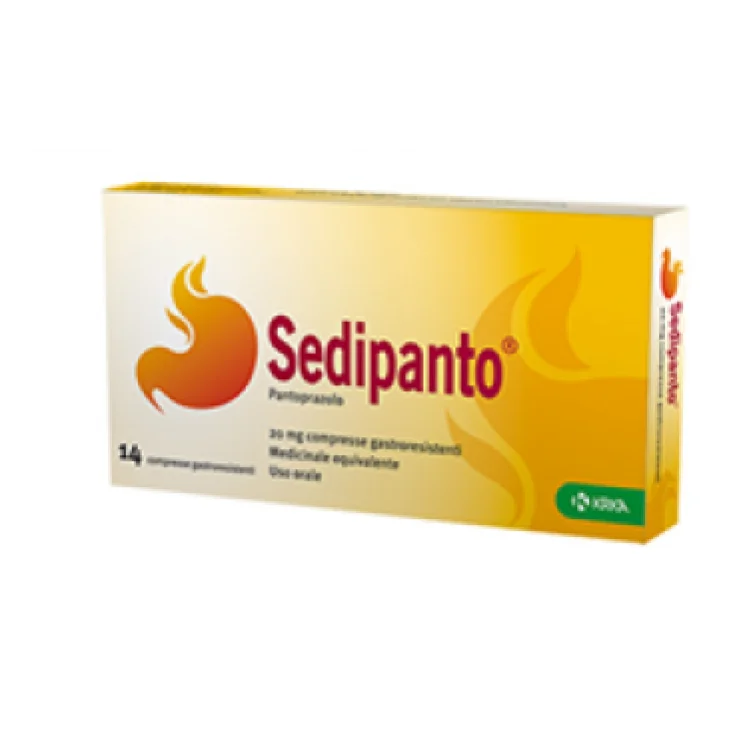Sedipanto® Pantoprazole 20mg KRKA 14 Gastroresistant Tablets

- Brand: KRKA FARMACEUTICI MILANO Srl
- Product Code: 042475020
- EAN:
- Availability: In Stock (evaso in 24 ore)
- 3 items
for 3,06€ each - 4 items
for 3,00€ each - 5 items
for 2,93€ each
Sedipanto Pantoprazole 20mg KRKA
What is Sedipanthus Pantoprazole?
Active ingredients contained in Sedipanto Pantoprazole
Where is Sedipanto Pantoprazole indication
Proper storage of Sedipanto Pantoprazole
Sedipanto Pantoprazole Contraindications and side effects
Undesirable effects with the use of Sedipanto Pantoprazole
Sedipanto Pantoprazole in Pregnancy and Lactation
What is Sedipanthus Pantoprazole?
Sedipanto 20mg 14 Tablets contains the active ingredient pantoprazole which blocks the "pump" that produces acid and therefore reduces the amount of acid in the stomach. It is used for the short-term treatment of reflux symptoms (for example, burning, acid regurgitation) in adults. Reflux is the backflow of acid from the stomach into the esophagus, which can become inflamed and painful. This can cause symptoms such as a painful burning sensation in the chest that rises to the throat (stinging) and a bitter taste in the mouth (acid regurgitation).
Pharmacotherapeutic category
Proton pump inhibitors.
Active ingredients contained in Sedipanto Pantoprazole
Pantoprazole 20 mg as pantoprazole sodium sesquihydrate.
Where is Sedipanto Pantoprazole indication
Sedipanto Pantoprazole is indicated for the short-term treatment of reflux symptoms (e.g. heartburn, gastric regurgitation) in adults.
Interactions
The medicine can reduce the absorption of active ingredients whose bioavailability is dependent on gastric pH (eg ketoconazole). Co-administration of atazanavir 300 mg / ritonavir 100 mg with omeprazole (40 mg once daily) or atazanavir 400 mg with lansoprazole (60 mg single dose) in healthy volunteers has been shown to cause a substantial reduction in bioavailability. 'by atazanavir. Absorption of atanazavir is pH dependent. Therefore, pantoprazole should not be administered with atazanavir. Pantoprazole is metabolised in the liver by the cytochrome P450 enzyme system. An interaction with other substances metabolised by the same enzymatic system cannot be excluded. However, no significant interactions were observed in specific tests with carbamazepine, caffeine, diazepam, diclofenac, digoxin, ethanol, glibenclamide, metoprolol, naproxen, nifedipine, phenytoin, piroxicam, theophylline and an oral contraceptive containing levonorgestrel and ethinyl estradiol. Although no interactions were observed during concomitant treatment with phenprocoumon or warfarin in clinical pharmacokinetic studies, some isolated cases of variation in International Normalized Ratio (INR) during concomitant treatment have been observed in the post-marketing period. Therefore, in patients treated with coumarin anticoagulants (e.g. phenprocoumon or warfarin), it is recommended that prothrombin time / INR be monitored when pantoprazole treatment is initiated, when treatment is discontinued or when administered intermittently. Concomitant use of proton pump inhibitors with methotrexate (mainly in high doses) may increase the levels of methotrexate and / or its metabolite hydroxymethotrexate and may cause toxicity due to methotrexate. Temporary withdrawal of the proton pump inhibitor may be considered in patients treated with high dose methotrexate. There were no interactions with concomitantly administered antacids.
Sedipanto when to take it
The recommended dose of Sedipanto Pantoprazole is 20 mg (one tablet) per day. To obtain an improvement in symptoms it may be necessary to take the tablets for 2-3 consecutive days. Once complete relief of symptoms has occurred, treatment can be stopped. Treatment should not exceed 4 weeks without consulting your doctor. If symptom relief is not achieved within 2 weeks of continued treatment, the patient should be advised to consult with their physician. No dose adjustment is necessary in elderly patients or in patients with impaired renal or hepatic function. Pediatric population: the use of the drug is not recommended in children and adolescents under 18 years of age due to insufficient data on safety and efficacy. The 20 mg gastro-resistant tablets should not be chewed or crushed, and should be swallowed whole with some water before a meal.
Proper storage of Sedipanto Pantoprazole
Store in the original package to protect the medicine from humidity. The expiry date refers to the product correctly stored, in an intact and sealed package. Keep out of the reach of children under 3 years of age. Do not exceed the recommended daily dose. Supplements are not intended as a substitute for a varied, balanced diet and a healthy lifestyle.
Sedipanto Pantoprazole Contraindications and side effects
Hypersensitivity 'to the active substance or to any of the other excipients; concomitant administration with atazanavir.
Excipients
Tablet core: mannitol; crospovidone (type B); anhydrous sodium carbonate; sorbitol (E420); calcium stearate. Film coating: hypromellose; povidone; titanium dioxide (E171); yellow iron oxide (E172); propylene glycol; methacrylic acid-ethyl acrylate copolymer (1: 1) dispersion 30%; sodium lauryl sulfate; polysorbate 80; macrogol 6000; talc.
Undesirable effects with the use of Sedipanto Pantoprazole
Disorders of the blood and lymphatic system. Rare: agranulocytosis; very rare: thrombocytopenia, leukopenia, pancytopenia. Nervous system disorders. Uncommon: headache, dizziness; rare: taste disturbances. Eye disorders. Rare: vision disturbances / blurred vision. Gastrointestinal disorders. Uncommon: diarrhea, nausea / vomiting, abdominal distension and bloating, constipation, dry mouth, abdominal pain and discomfort. Renal and urinary disorders. Not known: interstitial nephritis. Skin and subcutaneous tissue disorders. Uncommon: rash / exanthema / rash, pruritus; rare: urticaria, angioedema; not known: Stevens-Johnson syndrome, Lyell syndrome, erythema multiforme, photosensitivity '. Musculoskeletal and connective tissue disorders. Rare: arthralgia, myalgia. Metabolism and nutrition disorders. Rare: hyperlipidemia and increased lipids (triglycerides, cholesterol), weight changes; not known: hyponatremia, hypomagnesaemia. General disorders and administration site conditions. Uncommon: asthenia, fatigue and malaise; rare: high body temperature, peripheral edema. Disorders of the immune system. Rare: hypersensitivity '(including anaphylactic reactions and anaphylactic shock). Hepatobiliary disorders. Uncommon: increased liver enzymes (transaminases, gamma-GT); rare: increased bilirubin; not known: hepatocellular injury, jaundice, hepatocellular impairment. Psychiatric disorders. Uncommon: sleep disturbances; rare: depression (and all aggravations); very rare: disorientation (and all aggravations); not known: hallucinations, confusion (especially in predisposed patients, as well as worsening of these symptoms in the case of pre-existence). Diseases of the reproductive system. Rare: gynecomastia. The reporting of suspected adverse reactions that occur after the authorization of the drug is important, as it allows continuous monitoring of the benefit / risk ratio of the drug. Healthcare professionals are asked to report any suspected adverse reactions via the national reporting system.
Sedipanto Pantoprazole in Pregnancy and Lactation
There are no adequate data from the use of pantoprazole in pregnant women. Studies conducted on animals have shown reproductive toxicity. The potential risk for humans is unknown. The drug should not be used during pregnancy, unless absolutely necessary '. Animal studies have shown the excretion of pantoprazole in breast milk. Excretion into human breast milk has been reported. Therefore a decision whether to continue / discontinue breastfeeding or to continue / discontinue therapy must be made taking into account the benefit of breastfeeding for the infant and the benefit of therapy for the mother. The studies did not show an effect of pantoprazole on the fertility of male or female rats.
Sedipanto Format
Sedipanto Pantoprazole 20mg is sold in packs of 14 gastro-resistant tablets.






